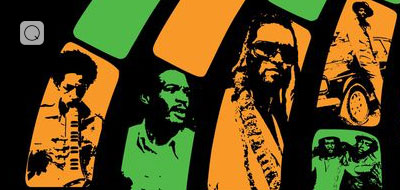For forty years, David Rodigan has been the voice of reggae on British radio. Since his early beginnings on BBC Radio London in 1978, this enthusiast has gone well beyond his function of radio presenter, as he went mixing in the clubs and festivals and became a world champion of soundclash, a Jamaican tradition that confronts DJs (the “selectors”) in a disc against disc duel, with the help of a special version of reggae classics called “dubplates”—the artist changing the lyrics to sing the praises of the selector. As he released, in early 2018 his book My Life in Reggae, David Rodigan talks with Qobuz about those secret songs, his trips to Jamaica, his frantic scene play or even his “mystical” meeting with Bob Marley.
You have just released your biography My Life in Reggae in which you tell the story of your career in music, that you have journeyed for 40 years. What was your original ambition?
All that I wanted was to be a stage actor for the Royal Shakespeare Company. I studied economics for a year, and it wasn’t for me. Then I took classes for three years to become an actor. I came across reggae completely by accident. A friend of mine wrote a letter for me to the BBC for a position of radio host on a reggae show. During the interview, the show producer, who was white, told me: “Mister Rodigan, I am sorry, but you aren’t of the good color.” I answered: “Okay, that’s fair.” Then, he gave my tapes to some West Indian producers, who advised him to hire me, regardless of my skin color. I think they heard my passion for music. This is how I got into BBC Radio London, to host the Sunday noon show. I was happy to share my discs for 90 minutes once a week and it never went further than that. I never looked for success; I just took the opportunity to dive further into the subject matter, like any enthusiast. Some want to work in a museum or a zoo, because it’s their passion. It was the same for me and reggae.
On stage, you are very dynamic, you talk, jump and dance constantly. Is it a way for you to show your untapped acting skills?
There’s a part of theatrical performance, but it’s mostly the natural expression of my passion for music. I love music so much that I can’t refrain myself from dancing. When I was a teenager, when I was going clubbing, I was always impatient to start dancing. I love answering to the music by moving my body. It’s been in me since childhood. But when I started DJing, in the late 70s, I was shy, nervous and restless, I was mumbling behind the mike. By the way, this is why I had hired an MC, Papa Face, and I settled for passing discs with my head down. Behind the turntables, the DJ feels safe, and aside from raising his hands up from time to time, he focuses on his mix and it’s great that way. Personally, I have no mixing skills, so there was no point pretending. With time, I gained confidence and, one day, I broke this wall between the DJ and the public. By getting closer to people, I thought that I could connect with them, and with the mic, I starting telling stories about the disc I was going to play. It became a way to share the history of reggae. But after saying a few words on the song or on the artist, I had to play the disc. And then, why not dance? And this is how it started. And I’d rather share my passion with the public and receive smiles rather than have an audience looking at a very serious DJ behind the turntables from afar.
In January 1979, you went to Jamaica for the first time to meet the big names of reggae. How did you gain acceptance? Did you have to gate-crash their studios?
No, I had a few contacts, and most of all, I had a great calling card thanks to the BBC. I had been a professional radio DJ for five months on Radio London, and being on the BBC opens doors for you throughout the world. And I was fiercely determined. I went to Maxwell Avenue, in Kingston, in the Channel One and Harry J studios, then on Orange Street, at King Tubby’s, where I also met King Jammy (who was at the time only Prince Jammy, Editor’s Note). It was crazy: every day, I lived a new adventure.
I asked where Treasure Island (legendary label from the rocksteady era in the 60s, Editor’s Note) was and if someone could take me there. Then, I went to the JBC, the Jamaican national radio, where I ran into Errol Thompson (one of the great sound engineers of the genre, Editor’s Note). There was also Mickey Dread (singer, producer and radio host, Editor’s Note), who was suspended by the JBC at the time, and we talked among peers. On the roof, I met Marcia Griffiths (a member of the I-Threes, the backing vocalists for Bob Marley & Wailers, Editor’s Note). A contact took me to another, but I didn’t force anything, I was simply determined to find as many things as I could while I was there. I didn’t want to waste time sitting under a palm tree. With me, there was also Mo Claridge—from Ballistic Records, a British label and distributor specialized in reggae—who came to sign discs. When word got out, all the artists came to see him and I took advantage of it. I also met legendary producers such as Bunny Lee (one of the pioneers of dub, Editor’s Note), Henry ‘Junjo’ Lawes (the producer who discovered Barrington Levy, Editor’s Note) who took me around Kingston in his BMW… So many things happened during this trip.
Create a free account to keep reading


